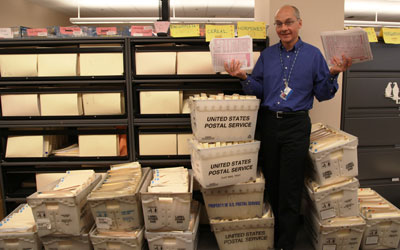On the Paper Chase! With Gary Chase Nurses' Health Study Senior Project
Manager

Gary Chase is flanked by reams of Nurses’ Health Study questionnaires.
|
The perimeter of Gary Chase's office
bursts with rainbow-colored file folders, while questionnaires scatter his
desk. Immediately next door, in the data collection room, is a similar scene
that looks more like a mailroom than the hub of one of the most influential
research studies to come out of BWH.
Chase is the senior project manager of
the Nurses' Health Studies, the largest and longest running investigations of
factors that influence women's health, which have led to ground-breaking insights
on health and disease. In the studies, participating nurses complete surveys
every few months, answering questions about their lifestyle, medical history
and current health.
Chase landed the role in 1987 after
spending three years post-college working for a marketing research company.
"During my interview, I met with three
of the senior investigators. There wasn't a conference room at the time, so we
pulled chairs into a hallway where they interviewed me. Three top researchers
and me in a hallway! Obviously they cared enough about this position to take
the time to meet me. That was neat," recalled Chase.
The
Architecture of a Question
Now, 25 years later, Chase continues
to oversee a team of research data coders in sorting, counting and processing
incoming questionnaires, sometimes receiving as many as 10,000 questionnaires
daily.
Asking questions, and knowing how to
ask them, is where Chase shines and invests most of his time.
"Questionnaires are the basis for
everything we do," said Chase. "That is where all the data comes from. You
can't do research unless you have good data."
It can take nearly six months to
create one questionnaire. Working with principal research investigators, Chase
participates in every stage of creating the questionnaire-from layout, to
ensuring that every question is clearly understood, right down to preparing the
mailing envelopes. And as completed questionnaires return, Chase leads the
meticulous activity of cleaning and double-checking the data. The entire
process starts in June and cycles every two years between the three Nurses'
Health Studies.
"My job begins with designing the
questionnaire and ends when a clean data set exists and I can hand it off to
the investigators so they can run their studies," said Chase. "By that time, it
is two years later and we do it all over again for each study."
Full
Speed Web Ahead
However, the paper chase could soon be
a thing of the past, as data gathering moves to the web.
"Over the last 10 years working on
Nurses' Health Study 2, we had to learn an entirely different way of collecting
data because we've been pushing to have more people fill out their questionnaires
on the web," said Chase.
In the current questionnaire cycle for
Nurses' Health Study 2, Chase and his team received 72,000 completed
questionnaires. Of these, about 53,000 were completed online.
"Not having an extra 50,000 or so
questionnaires come through this office is huge in terms of saving a lot of
effort and money," said Chase.
Chase is excited for the next
generation of the cohort clan-Nurses' Health Study 3. Unlike its predecessors,
Nurses' Health Study 3 will be exclusively online at http://www.nhs3.org/ and include a broader population of
nurses.
The team is in the process of
recruiting not only registered nurses, but also licensed practical nurses,
nurse practitioners, vocational nurses, etc. The goal is to recruit 100,000
women. To date, about 30,000 women have enrolled.
As Chase gears up to follow the next
generation of nurses, and the challenges it holds, one thing remains constant
in his mind: accuracy.
"What we're doing is affecting how
people live their lives and how the government sets standards," said Chase.
"Also, the things that I do here with the data are at the base of what another
100 people do after I pass the data along. Their careers are dependent on
taking the data that is created here and being able to trust it. Well, you can
trust it because I've been holding the hand of that data since it was created."

Gary Chase and Nurses’ Health Study administrative team.
|